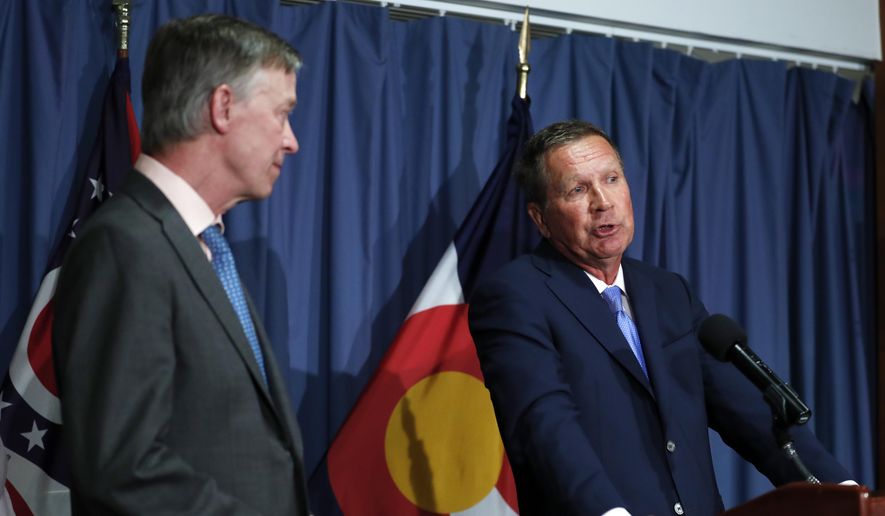A bipartisan pair of governors advised Congress Thursday to bolster Obamacare’s ailing markets by funding critical insurer payments and a temporary fund for super-costly customers, while making it easier for states to forge their own path.
Ohio Gov. John Kasich, a Republican, and Colorado Gov. John Hickenlooper, a Democrat, said Congress should keep the Affordable Care Act’s unpopular “individual mandate” requiring Americans to get covered or pay a tax in place for now, until it can find a credible replacement that spurs healthier people into the marketplace.
Yet the governors said the federal government should make it easier for states to duck Obamacare’s strictures, where appropriate, by streamlining waivers that were written into the 2010 law to let states act as laboratories for reform.
In a letter to Capitol Hill leaders, Mr. Kasich and Mr. Hickelooper said despite partisan entrenchment over health reform, all sides can agree that swift action is needed to slash premiums and increase choices in the individual insurance market, where roughly 20 million people buy insurance on their own.
Six additional governors from both parties signed onto the letter.
Obamacare roiled the markets by falling short of enrollment targets, particularly among young and healthy enrollees. Meanwhile, President Trump has wavered on enforcing parts of the law designed to keep costs in check.
The dynamics have combined to create a maelstrom of uncertainty for insurers and consumers heading into 2018.
Mr. Kasich and Mr. Hickenlooper said it is important for Congress to send a “strong signal” by passing stabilization measures now, since insurers must decide by the end of September whether to participate in the markets.
“The current state of our individual market is unsustainable and we can all agree this is a problem that needs to be fixed,” they said in a letter to Capitol Hill leaders. “Governors have already made restoring stability and affordability in this market a priority, and we look forward to partnering with you in this effort.”
Their blueprint for reform calls on Congress to appropriate “cost-sharing” payments that reimburse insurers for picking up low-income customers’ costs. Mr. Trump has threatened to use a legal ruling against the payments as a way to withdraw the money, hoping it would provide leverage over Democrats who’ve opposed his repeal plans.
The governors said funding the payments will lower premiums — insurers will try to make up for any lost funding — and save money in the long run, since Obamacare’s premium subsidies rise with rates.
It also calls on Congress to set up a temporary stability fund, at least for two years, to offset high costs that insurers sustain from taking on extremely sick patients, so that other consumers don’t end up paying more. They noted that House and Senate lawmakers proposed $15 billion per year in recent repeal bills, although they want Congress to offset the money with cuts elsewhere.
The governors’ blueprint also urges the federal government to continue enrollment outreach ahead of Obamacare’s sign-up season this fall — Mr. Trump has been lukewarm about it so far — and strengthen “risk-sharing” programs that were undercut by past spending deals in Congress, so insurers don’t raise their rates to make up their losses on pricey medical claims.
The duo’s push sets the table for Capitol Hill lawmakers who are grasping for a way forward on health care, after defections from three Senate Republicans doomed efforts to prolong the debate over plans to repeal and replace Obamacare on GOP votes alone.
The Senate Health Committee will vet ideas from state insurance commissioners and governors, including Mr. Hickenlooper, during hearings next week on a potential “stabilization” bill.
The panel on Thursday said they’ve invited policy experts for a Sept. 14 hearing on ways to give states more control over the markets.
Committee Chairman Lamar Alexander, Tennessee Republican, says state flexibility is an important trade-off for funding the cost-sharing payments.
To that end, the Kasich-Hickenlooper plan says states should be able to tweak the “essential health benefits” that plans are mandated to offer under Obamacare, and be allowed to combine separate waivers if it helps them reform their markets without raising the deficit.
They’d also like the federal government to encourage states that find ways to peg health payments to whether doctors and hospitals are providing good care.
“As we move beyond the immediate crisis, the real challenge over time will be to confront the underlying cost drivers of health care spending, and reset incentives to reward better care for individuals, better health for populations, and lower cost,” the governors said.
They also told leaders to eschew the secretive process that preceded GOP replacement bills earlier this year.
“Lasting solutions will need support from both sides of the aisle, and we applaud the bipartisan efforts that have now commenced in both the House and Senate,” they wrote. “We ask that you support these efforts to return to regular order, allowing committees to work in an open, transparent and bipartisan manner.”
The governors’ decision to reach across the aisle has lifted hopes for bipartisanship in a polarized political climate. It also raised questions about their political ambitions in 2020.
Yet Mr. Kasich, who challenged Mr. Trump for the GOP nomination last year, told NBC’s “Meet the Press” last weekend that he will not mount a joint presidential bid with Mr. Hickenlooper.
• Tom Howell Jr. can be reached at thowell@washingtontimes.com.




Please read our comment policy before commenting.